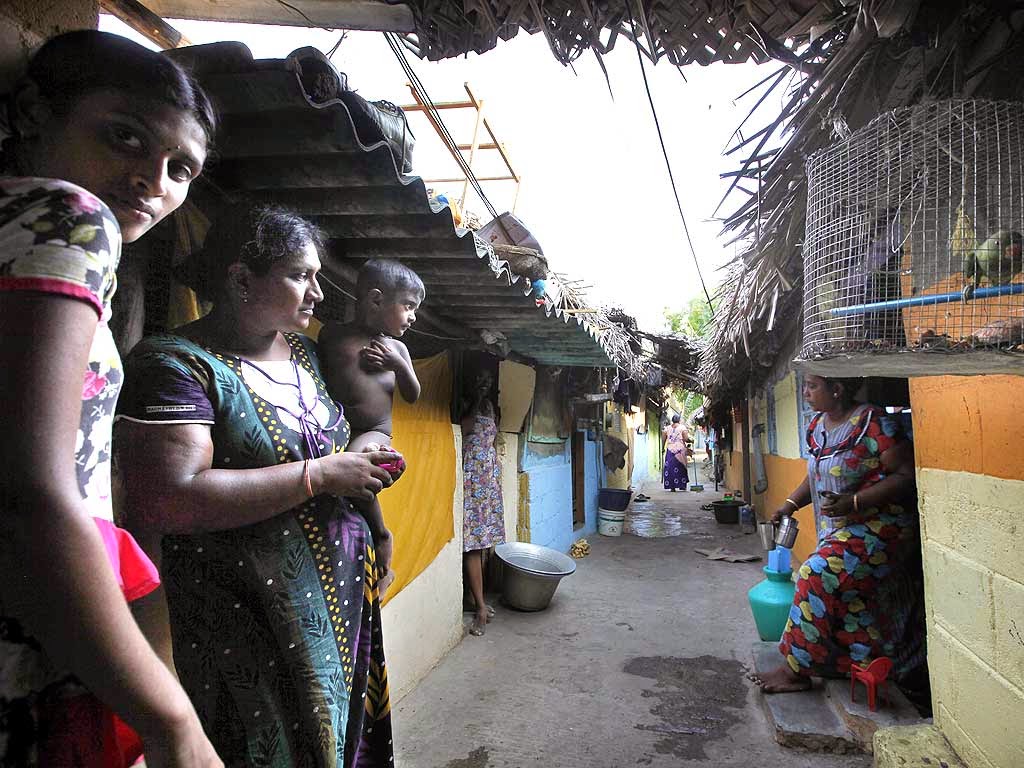Paramita Ghosh, Hindustan Times
Karuna starts each time a car stops outside the door. He shows his wounds at the hands of the Sri Lankan army; the ones that have been inflicted by an Indian policeman hurt no less. “I should return to the camp,” he says after an hour. “I’m out of work, I might be asked by the cops why I had to stay out so late.”
No one takes a pause in Chennai. The sentences spoken are long, the exchanges, hurried, and there is drama everywhere. By the time we reached another house in a lane, where we had hurriedly gathered after a failed attempt to interview refugees at a camp, we had had enough.
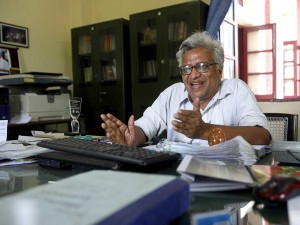 |
| Professor Ramu Manivannan of Madras University, had gone to Geneva as an independent observer to witness the recent UN proccedings. “With the US-driven UN resolution, India is no longer a … |
But the evening had more in store. Veda, another refuge, protests our attempts to prove that she is real. No pictures, she says in Tamil to our translator, who is doing double duty reassuring both of us that the interaction would land her in no bigger trouble than what she found herself in when she came by boat to Rameshwaram from Kilinochchi in 2009, the year the 25-year-old civil war in Sri Lanka came to a brutal end.
The refugees stay in general camps (close to a 100) and ‘special camps’ (three) in Tamil Nadu. All of them are under watch, says People’s Union of Civil Liberties (PUCL), the rights body that has been fighting for the Tamil refugees’ rights for over 20 years.
Veda has brought along a friend, a fellow refugee, with a different ‘problem’ — we can take her picture from the back but cannot name her — and for two hours on the bare terrace of a grocer’s shop 50 km from a camp in Chennai, I fill my notebook again with newer experiences with different pauses, new hesitations,
new exclamation marks, new full stops, new areas of emphasis of a story that I was to hear over and over again — never inside a camp, because of the constant surveillance from the state police intelligence wing, but outside it.
Refugee stories usually begin like this: Till 1990, Sri Lankan Tamils clambering off a boat in Rameshwaram would be met and registered by, among others, a Jesuit priest and journalism professor at Madras University. By 2005, intelligence officials had become their handlers, and it seemed, they had been trained to force out the refugees’ “connection” with the Liberation Tigers of Tamil Eelam (LTTE), a guerrilla force India helped train in solidarity with Sri Lankan Tamils. The operation — linked to India’s geo-political concerns in the mid-Eighties was dumped towards the end of that decade — led to Rajiv Gandhi’s assassination in 1991.
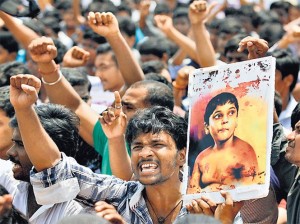 Balachandran, Prabhakaran’s youngest son, was shot dead allegedly by the Sri Lankan army. Chennai erupted in protest in 2013 after ‘No Fire Zone,’ a Channel 4 documentary on the war crime, was seen worldwide. Will these sentiments have an impact on the way Tamil Nadu votes. (AP photo)
Balachandran, Prabhakaran’s youngest son, was shot dead allegedly by the Sri Lankan army. Chennai erupted in protest in 2013 after ‘No Fire Zone,’ a Channel 4 documentary on the war crime, was seen worldwide. Will these sentiments have an impact on the way Tamil Nadu votes. (AP photo)According to PUCL, there are atleast 1,20,000 refugees in Tamil Nadu’s camps, the detritus of the civil war the Sri Lankan government itself says ended five years ago. In India, that war has, strangely enough, been kept alive. Most of them are under surveillance in Tamil Nadu in exchange for basic survival in general camps. The number of people who have been in ‘special camps’ for over three years, and without legal representation, is not known. A Department of Rehabilitation handbook of the Tamil Nadu government, available online, rolls out a series of commandments: “Any individual refugee/repatriate information should not be disseminated; intelligence (criminal proceedings against the refugees) information should not be disseminated; whereabouts of the groups of refugees should not be disseminated; information about the repatriated persons to Sri Lanka should not be disseminated.”
Chennai expressedBut people are talking and Tamil Nadu hopes the rest of India is listening. For the past five years, a ‘save Tamils’ movement, under the banner of 11 activist organisations, has been gathering force in the state, especially in Chennai, where their shout, says Senthil, an activist, has had the best results. By doing politics without taking part in elections, Thozhar Thiagu, general secretary of the Tamil National Liberation Movement, and one of the key figures behind the mass movement, says they “have been able to do more, and make political parties respond to people’s sentiments and come out with a party line on refugees”. The AIADMK chief, Jayalalitha, who had been “anti-Eelam and anti-LTTE till the Nineties, and even till the outbreak of the war, passed a resolution in the Assembly in 2012 calling on the UN to declare the Sri Lankan president, Mahinda Rajpaksa, a war offender, and the intent and content of the war, a genocide,” he says.
India’s abstention from voting on the 2014 UN resolution against Sri Lanka seeking an international investigation into the alleged war crimes during the final phase of the island’s civil war, say local pundits, will cost the UPA dear this election. Anti-Congressism will ride on any horse, “even a BJP horse”, says Balakrishnan, a local doctor who has turned anti-DMK, a former UPA partner, precisely for that reason even though he is aware of the hands-off policy of all parties regarding the refugee question. (Radhakrishan, headquarters secretary, DMK, however, says, “No party has done more.”)
Just this week, Narendra Modi, the BJP’s prime ministerial candidate, said Pakistani Hindu refugees must have “equal rights” as Indian citizens. But the party’s election manifesto does not mention Tamil refugees. Elangovan, an IT professional, also questions the “preferential treatment” given to Tibetans. (Following a Karnataka court order, children of Tibetan refugees born in India between 1950 and 1987, will for the first time, vote in an Indian election this year). They “can protest, even militantly so, on India’s streets against China”, adds the Chennai resident sympathetic to the refugees.
For Tamil refugees, any evidence of assertion, forget violence, is counter-productive. Veda, for example, says her “own injuries” made her suspect. In the police’s eyes that makes her an LTTE member. Her nephew, who has just arrived from Jaffna, is 21, the generation the Sri Lankan military assumes flew the LTTE flag without exception. The police in Tamil Nadu, Veda says, thinks the same. She goes on to reveal something startling: “The Q branch (the anti-terror wing of the state police) has forced labourers at the Goomidpoondi camp to pilfer steel from the factories where they work,” she says.
This is not refugee fiction or pay-back, assures an NGO member, working at the camp, on the condition of anonymity. Only two NGOs are allowed to work in Goomidpoondi. The permission to work there is oral, which means it can be withdrawn at any time. “When I interact with the refugees, the Q branch cop is there taking notes… In 2008, refugees were made to rob a bank. In 2011, refugees were caught in an ATM robbery at Madurai. Local Tamils and the Q branch were involved,” he says. If Veda raises a stink, her nephew may be packed off to any of the two ‘special camps’ in Tamil Nadu. Chennai-based advocate Angyarkanni says FIRs at these special camps are based on “no prima facie evidence, have no criminal points”. “They have held boys in these camps for keeping Crocin in their bags, just because they were from LTTE-controlled areas. In Sri Lanka, it is a quicker death, by bullet. Here, they die daily,” she says.
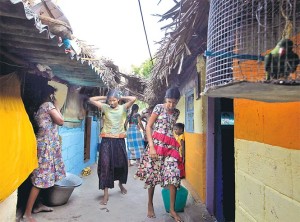 The Sri Lankan civil war ended in 2009 with the death of LTTE leader Velupillai Prabhakaran. It turned 10 lakh Tamils into refugees. Over a lakh refugees are in camps in India. Goomidpoondi, near Chennai, is one of the biggest.(HT photo/Sanjeev Verma)
The Sri Lankan civil war ended in 2009 with the death of LTTE leader Velupillai Prabhakaran. It turned 10 lakh Tamils into refugees. Over a lakh refugees are in camps in India. Goomidpoondi, near Chennai, is one of the biggest.(HT photo/Sanjeev Verma)Flip-flop politicsIndia is not a signatory to the Geneva Convention of 1951 that recognises the rights of refugees, points out professor Ramu Manivannan, author, Sri Lanka: Hiding the Elephant. He had gone to Geneva as an independent observer to witness the recent UN proccedings. India has also not enacted the model law of refugees drafted by the PN Bhagwati committee advising a provisional citizenship, he says. A draft law has also been pending before Parliament since 2006.
Other countries that have accepted Tamil refugees and allowed them to live with dignity offer a contrasting picture. Rathika Sitsabaiesan is a Canadian MP of Tamil origin; two lakh Tamils live in Canada as refugees with refugees’ rights. Almost that same number reside in India as an undefineable people — not refugees, but foreigners under the Foreigners’ Act.
India’s flip-flop on the Rajpaksa government’s record and status quo on the Sri Lankan refugees, is, however, only half hamstrung by its refugee policies. “Rajpaksa has said that by crushing the Tigers, they won India’s war. India has returned that favour; its silence on the issue makes it complicit,” points out Manivannan. “But what it does not realise is that with the US-driven UN resolution, India is no longer a factor in south Asia.”
The desire for Indian ‘influence’ in the region, longed for by a section of the Tamil population on both sides of the maritime border may complicate and confirm Sinhala fears about its Tamil population and India’s role in unsettling it, say experts. Can, or should India, play Putin? “The answer is no. The question of Sri Lankan sovereignty should, however, be kept separate from its record on human/refugee rights,” says Thiagu. “Just like South Africa was isolated in the international community, the diaspora is working towards making the Sri Lanka government lose its legitimacy in the community of nations and even in the eyes of the Sinhalese, who were also victims of the war, and a few of them, for being pro-Tamil.”
Residents of refugee camps are not holding their breath either way. Half of them spend their nights wondering if they should go back to Sri Lanka, despite the threat to life, and then apply for citizenship in Europe. “Just for the kids,” says Veda.
For those who still dream of a future in India, the choices are fairly simple. In Vavuniya, Murali, a student of literature was studying to be a teacher when the war broke out. In India, he is a car-washer with the dream of owning his own shop. He earns Rs. 15,000 a month, half of which he sends home to his parents in Sri Lanka. With the rest, he pays rent, eats, and helps out a cousin in a camp. “Tamil Eelam in the long-term and a car-shopowner in the short term, you know,” he says in dead earnest. He’ll just have to work it out.
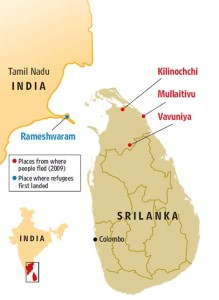
Started in 1976 by socialist leader Jayaprakash Narayan, People’s Union for Civil Liberties (PUCL) is the oldest human rights body of India. V Suresh, its national general secretary, has been fighting for the rights of Tamil refugees in India’s special camps for over 20 years. Special camps are actually like concentration camps, he says.
What is the difference between a general and a special camp? The first are open camps with restriction of movement. People can go out for work after three levels of police clearance. Special camp inmates don’t have the meagre facilities that prisoners in regular jails do like parole, remissions, visits of relatives and friends, work with wages and access to a library. It is not unknown for state police to settle scores with Sri Lankan Tamils by implicating them in false cases and then use that as an excuse to put them in special camps. Their claim that the inmates are deadly LTTE cadres is false. PUCL has been demanding that these special camps be closed as they constitute a huge human rights abuse.
What’s the cost of maintaining the camps? In 2013, PUCL was requested to talk to inmates in Poonamallee camp and help call back their fast unto death. The unwell inmates had been deprived of proper food and healthcare. The entire camp which was lit up by strobe lights had just six to 10 inmates under watch by heavily armed forces and the police. The costs were stupendous — close to `40 lakh. Inmates are given `80 per day to take care of themselves.
How long can they be kept inside?When they were locked in the special camps, these inmates had no criminal cases against them. In some cases, when they were released through judicial orders whether by way of acquittal or securing bail, the Tamil Nadu police invoked the Foreigners Act to imprison them. This Act permits the state and the central government to lock up foreigners in these high-security prisons, euphemistically called special camps and to throw away the key and forget them. Nearly 80 per cent of the criminal cases against the inmates end up in acquittals but by that time they have already spent about four years in special camps that are actually like concentration camps.
Do refugees in general camps fare better? Can they get citizenship?
They do. Children born in India whose one parent is a Tamil from Tamil Nadu can get citizenship. The first phase of refugees who came in the Eighties have been here for 30 years. 90% of them still haven’t got citizenship.

